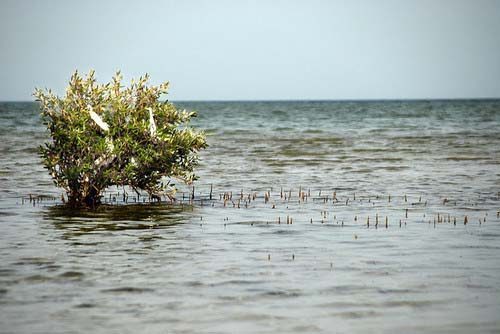
The mangroves just south of Wakra – much loved by walkers and picnickers – are in “grave danger” due to the construction of a new port in the area, according to UNESCO Ecological Sciences Adviser for the Arab Region Benno Boer.
“I went there a couple of days ago and there were fences all around, the only way to see the condition of the mangroves would be with a satellite,” he told the Peninsula.
Boer made the comments at Lusail Marina yesterday, where he was unveiling an experiment on the viablity of floating mangroves.
UNESCO hopes the small-scale trial will spark interest and lead to more mangroves being planted worldwide.
Qatar’s $7.5 billion new port, expected to be completed in 2016, will play a critical role in bringing in the construction materials the country needs to meet its 2022 World Cup development deadlines.
Carbon eaters
Mangroves play a vital part in helping to reduce climate change by acting as a very efficient carbon sink – they absorb up to 50 times more carbon than a similar area of tropical forest.
They’re also an important eco-system, offering a safe breeding place for many varieties of fish. Concerns were raised by fishermen in the Wakra area as far back as 2011 about the impact the destruction of local mangroves might be having on fish stocks.
Mangroves are under threat in all countries in the world where they grow naturally – only the UAE and Etritrea are actively planting new mangroves.
Qatar is home to at least eight major mangrove sites.
“Mangroves in eastern Qatar need priority conservation and research,” Boer told the Gulf Times in January. “Awareness, management and conservation plans need to be developed, in order to generate the much needed attention with top level political support. Abu Dhabi deserves applause because it is one of the few countries that actually show an increase in mangrove coverage.”
Boer has called for mangroves to be protected by Emiri decree.

UPDATE | April 24
New Port Project officials have written Doha News, saying the mangroves are indeed protected by a 2006 Emiri decree. The NPP added:
Where it has not been possible to avoid entirely the impacts to mangroves (a port development, by its very nature, necessitates the occupation of some coastal space), in consultation with the Ministry of Environment, we have established a program to relocate and replace affected trees.
To date, the NPP has relocated some 2,587 mangrove seedlings from the NPP lagoon area to the larger Umm Haloul mangrove area, which it says has not been affected by the project. NPP has also grown 2,752 mangrove seedlings in an offsite nursery to be planted at Umm al Houl.
—
On its website, the New Port Project outlines what it has been doing to minimize environmental disruptions, including mangrove and coral relocation:
In late 2012 the New Port Project undertook what is thought to be the region’s largest coral relocation programme; the programme involved the removal, transport and reattachment of approximately 10,000 healthy hard coral colonies of various species and size classes. A companion program will see the relocation of 10,000 m2 of seagrass meadow from under the footprint of the Qatar Emiri Navy Base to a site north of the Project.
Thoughts?
Credit: Top photo by SophMattGunner; second photo courtesy of NPP’s website.







